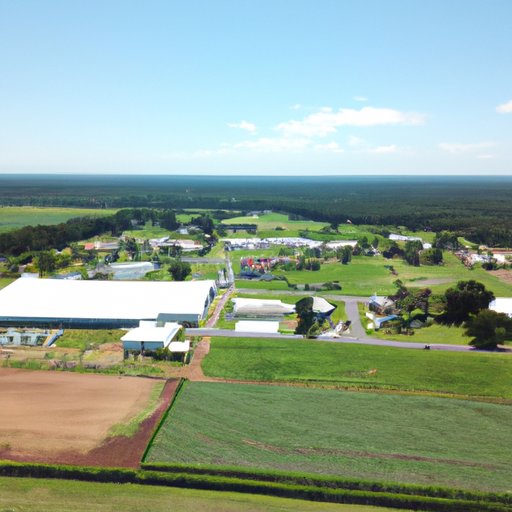The Plantation: Historical Significance and Modern-Day Interpretations
Plantations have been a fixture of the American South for centuries, evoking images of sprawling fields, grand homes, and a complex social hierarchy. However, the history of the plantation is a complicated one, intertwined with the legacy of slavery, Southern economic development, and modern-day tourism and industry. In this article, we will explore the historical and modern-day significance of plantations and their impact on American culture and society.
Historical Perspective
Plantations, in their historical context, were large agricultural estates worked by enslaved laborers. These laborers were primarily of African descent and forced to work in brutal conditions, enduring physical abuse and family separation. The plantation system emerged in the 17th century and became a lucrative source of income for landowners in the Southern region of the United States.
Plantations had a significant impact on the economy of the antebellum South, accounting for a vast majority of agricultural production, including tobacco, cotton, and rice. The labor of enslaved people contributed to the wealth of plantation owners and the development of the Southern economy. However, this wealth came at a profound cost, with the human rights of millions of enslaved people violated, leading to one of the darkest chapters in American history.
The Civil War and Reconstruction brought significant changes to the plantation system, with the abolition of slavery and the economic upheaval of the Southern economy. The former plantation owners faced difficult decisions on how to recover their lost wealth, with many turning to tenant farming and sharecropping. These systems still exploited Black laborers, but in different ways than slavery. The legacy of the plantation system loomed large over the country and continued to impact race relations in the United States.
Modern-Day Plantations
In modern times, plantations have evolved from their historical contexts, moving towards the agricultural and hospitality industries. While some historical plantations have remained intact, many were destroyed or repurposed in the post-Reconstruction era. Modern-day plantations typically offer tours, events, and accommodations for visitors.
Plantations play an essential role in the agricultural industry, with modern farms working to promote sustainable agriculture practices. Additionally, plantations have become popular destinations for tourists, who flock to learn about the historical significance and architectural beauty of these properties. The hospitality industry has capitalized on the popularity of plantation tourism, offering visitors the opportunity to stay overnight in these grand structures.
Architecture & Design
One of the most striking features of the plantation is the architecture and design of the homes. Plantation homes are often noted for their grandeur, with the Greek Revival and Gothic styles being prominent influences. These designs sought to convey the wealth and power of plantation owners while also responding to practical needs, such as providing ventilation in the hot and humid Southern climate.
While many plantations have been preserved as historical landmarks, others have been repurposed or renovated for modern use. Some plantations have been transformed into bed and breakfasts, event spaces, or museums. These repurposing efforts provide an alternate future for plantation sites, allowing them to live on while acknowledging their complicated histories.
Plantation Tourism
Plantation tourism has been on the rise, with more visitors flocking to plantations to learn about their historical significance. Visitors can take tours of the homes, learn about the landscape and overall architecture of the property. Many tours also focus on the history of slavery and the impact of plantation living on enslaved people. Additionally, hospitality companies offer overnight stays, gourmet dining options, and spas. These offerings have both drawn criticisms for glorifying the legacy of slavery and for preserving a crucial part of American history.
While plantation tourism can be a fascinating and worthwhile experience, visitors should be mindful of the complicated legacy of these sites. Visiting a plantation should not exist in isolation, rather, it should be coupled with continued education and an understanding of the history of slavery in America.
Plantation Economics
While the plantation system has been dismantled, the agricultural industry is still of the South’s primary economic drivers. Many farming operations remain modeled on the plantation system, with landowners hiring contract laborers and owning vast tracts of land. Plantations also provided important contributions to the economy of the United States, with the Caribbean and Latin America providing essential agricultural exports to the US, facilitating trade. To this day, the plantation system’s economic importance in the South is still visible through the agricultural industry.
The Legacy of Plantations Today
The legacy of plantation life is still felt today, with the conversations surrounding race, oppression, and historical awareness ongoing. For many Black communities, plantation tourism represents a continued glorification of slavery, while for others, it serves as an important reminder of the struggles of the past. The continued preservation and repurposing of plantation sites is a fraught conversation that reflects the complicated relationship between history, heritage, and legacy.
Ultimately, understanding and acknowledging the historical context of plantations is the first step in moving forward. Whether it’s through continued education, conversations surrounding tourism and economic development, or preservation efforts, the legacy of the plantation will continue to impact American culture and society.
Conclusion
Plantations have a rich and complicated history in the United States, embedded in the legacy of slavery and Southern economic development. While the economic and social systems of the plantation era have been dismantled, their influence still lingers. Understanding the role of plantations in American history and acknowledging their complicated legacy is crucial in moving forward. Whether through museums or repurposed accommodations, plantation sites can provide a thrilling glimpse into the past while also working to craft impactful futures.
